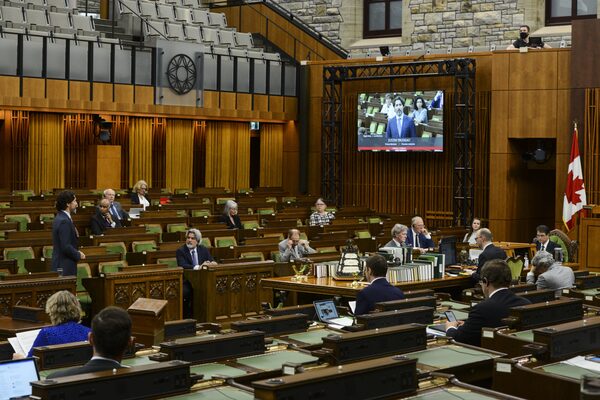
Prime Minister Justin Trudeau is projected onto large screens as he speaks in the House of Commons on Parliament Hill in Ottawa on May 27, 2020.Sean Kilpatrick/The Canadian Press
Why should they meet at all? Never mind whether members of Parliament should be permitted to participate by videoconference, rather than in person – a temporary rule change, adopted during the pandemic, the government now wants to make permanent. If MPs can vote, debate, ask questions and attend committee hearings remotely, why should they bother to show up in the flesh?
Think of all the time they now spend travelling all the way to Ottawa and back. Think of the many days and nights they must endure away from their families.
True, there doesn’t seem to be any shortage of applicants for the job, but still: think of how many more people would participate in public life if they could do so from the comfort and convenience of their own living room! If, as the government argues, letting MPs phone it in some of the time would lead to improvements in MPs’ mental health, diversity and other good things, how much more would this be true if they did so all of the time?
Indeed, it’s a wonder we ever insisted they meet in the first place. Remote voting has been possible since at least the telegraph. As for the rest, surely MPs could make their views known by issuing statements, holding news conferences, writing letters to the editor and the like. What’s the big deal about sitting them all together in the same room?
And yet every legislature in the world does. Somehow it was universally agreed that the people’s representatives physically assemble in a large, ornately decorated chamber, and do most of their business there. And while many legislatures experimented with remote or hybrid sittings during the pandemic, virtually all have since reverted to meeting in person.
Possibly there is a reason for this. Maybe it has something to do with why trials are held in person – defendant and plaintiff, accuser and accused, forced to confront each other in the same courtroom. Or why the most effective means of protesting some injustice, to this day, is simply to gather a lot of people in one place, a right so fundamental it is protected in the Constitution.
No one who has sat in the gallery of the House of Commons, however jaded about politics they may have become, can fail to be moved by the sight of those 338 MPs arrayed below them, from every corner of this absurdly distended country, of all heritages, a civics-class cliché come gloriously to life.
That presence has huge symbolic power, not only for the onlookers but the participants. Not only does it project, it solemnifies. It signals something of importance is going on.
No, the proceedings aren’t always that dignified. They shouldn’t be. When MPs yell at each other, they are usually acting, but they are acting out the real tensions and aggravations of their constituents – who must, after all, endure the consequences of their decisions.
When a minister is in trouble, forced to stand and answer questions from a howling opposition, they are engaged in a ritual demonstration of humility before the voters. It is theatre, but it is necessary theatre, through which the public is engaged and instructed in the controversies of the day.
There are other, subtler benefits of MPs being present in the House: the private comity, as much as the public conflict; the chance meetings, hallway insights, that would not otherwise occur. The point is: why would we want to do anything to diminish this? Parliament is in enough trouble as it is, weakened by decades of assaults on its powers and prerogatives. Why would we want to hasten its decline?
Maybe it’s not strictly necessary for MPs to vote in person. But there can be little doubt that the jarring shifts between the real thing and the video we have watched over the past year are calculated to alienate the public and trivialize the proceedings.
And it can only get worse. Once the practice is entrenched, depend upon it, more and more MPs will take advantage of it; certainly more ministers will, rather than face the wrath of the House in person. And once we go down this road, we can never go back.
Pressed, its advocates – the Government House leader, Mark Holland, who has urged this change upon the House; the Liberal and NDP members of the Procedure and House Affairs Committee, who recommended it – will acknowledge this. Yes, yes, they will say: on the one hand, Parliament will be even less relevant, ministers even less accountable, than they are now. On the other hand, well, it will make life easier for MPs.
Those are indeed the trade-offs. That is the choice. But how tiresomely predictable it is that, given a choice between the public interest and the comfort of MPs, they would so unhesitatingly choose the latter.
 Andrew Coyne
Andrew Coyne